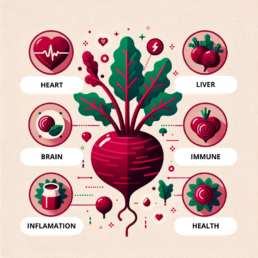What are the benefits of taking beetroot supplements?
What are the benefits of taking beetroot supplements?
Welcome to the vibrant, red, purple, and somewhat underrated world of beetroot, a true nutritional powerhouse that’s more than just a splash of color on your plate or in your juicer.
Beetroot, or as some like to call it, nature’s powerhouse, is packed with an array of vitamins and minerals; it literally contains a treasure trove of health benefits built-in vegetable form.
Now, let’s dive a bit deeper, shall we? We’re not just talking about beetroot in its raw or cooked state; nope, we’re venturing into the realm of beetroot supplements – a concept catching on for its convenience and concentrated goodness. Raw, potent, and loaded with heart-healthy nutrients, beetroot supplements are taking off; let’s discover why!
What are the benefits of taking beetroot supplements for improved cardiovascular health?
Beetroot supplements have garnered significant attention recently and in the past for their cardiovascular benefits.
The secret lies in their high nitrate content, which the body converts into nitric oxide. This compound plays a crucial role in regulating blood vessel dilation, thereby enhancing blood flow and reducing the strain on the heart to name just a few of it’s important functions.
Beetroot Studies
Studies have shown that the regular intake of beetroot supplements can lead to improved heart health. For instance, research published in the Journal of Nutrition demonstrated that beetroot supplementation resulted in lower blood pressure and arterial stiffness, two key factors in maintaining and keeping cardiovascular health. Additionally, the beetroot’s antioxidant properties help reduce oxidative stress, which is a major contributor to heart disease.
Benefits Of Beetroot
The benefits of taking beetroot supplements regularly extend to the reduction of bad cholesterol levels while simultaneously increasing good cholesterol. This balance is vital for preventing plaque buildup in arteries, a leading cause of heart attacks, strokes, and death, especially in the West.
Folate In Beetroot
Furthermore, the presence of compounds like betaine and folate in beetroot aids in reducing homocysteine levels, high levels of which are associated with an increased risk of cardiovascular diseases.
What are the benefits of taking beetroot supplements for enhanced athletic performance?
Beetroot supplements have become a popular ergogenic aid among athletes, ergogenic meanins ( helps with sports) .
The nitrates in beetroot are converted into nitric oxide, which enhances blood flow to muscles, improving oxygen and nutrient delivery and enhancing sports performance.
Boosting Sports Performance
This process is particularly beneficial during high-intensity workouts or endurance sports, where efficient oxygen utilization is critical for performance. A study in the Journal of Applied Physiology found that athletes who consumed beetroot supplements before exercising experienced significant performance improvements and delayed fatigue.
The benefits of beetroot supplements in athletic and sports performance also include faster recovery times.
Beetroot Is Anti-inflammatory
Beetroot’s anti-inflammatory and antioxidant properties help reduce muscle soreness and aid in quicker recovery post-exercise. Athletes consuming beetroot supplements have reported feeling less muscle pain and faster return to peak performance levels after strenuous workouts. The improved blood flow also contributes to better thermoregulation during exercise, allowing athletes to maintain optimal body temperature and performance.
What are the benefits of taking beetroot supplements for blood pressure regulation?
The regulation of blood pressure is another key benefit of beetroot supplements, but as a caveat, only the highest quality ones really work well; more on that later.
High blood pressure, or hypertension, is a common health concern that can lead to severe health complications if left unmanaged. The nitrates in beetroot are effective in dilating blood vessels or opening them, which helps lower blood pressure.
Blood Pressure
A meta-analysis in the Journal of Nutrition highlighted the significant impact of beetroot juice supplementation in reducing systolic and diastolic blood pressure.
The impact of beetroot supplements on blood pressure is particularly beneficial for individuals with hypertension or those at risk of developing cardiovascular diseases. By improving endothelial function, which is the ability of blood vessels to dilate, beetroot supplements contribute to overall cardiovascular health. Moreover, the potassium content in beetroot also plays a role in blood pressure regulation by balancing out the negative effects of sodium.
Cardiovascular Health
The mainstream benefits of beetroot supplements encompass improved cardiovascular health, enhanced athletic performance, and effective blood pressure regulation. These benefits stem from the high nitrate content of beetroot, which the body converts into nitric oxide, improving blood flow and oxygen delivery and supercharging the heart. The antioxidant and anti-inflammatory properties further contribute to heart health and recovery post-exercise.
As a natural supplement, beetroot offers a convenient and effective way to enhance overall health and well-being.
Exploring the Lesser-Known Benefits of Beetroot Supplements
Beetroot is known for its deep crimson color and earthy flavor. It’s often consumed for its taste and nutritional value, but what’s less known are the remarkable health benefits of beetroot supplements, especially relating to cognitive health, anti-inflammatory effects, and liver health.
Cognitive Health: Improving Brain Function and Reducing the Risk of Dementia
- Mechanism of Action
- Beetroot is rich in nitrates, which the body converts into nitric oxide. Nitric oxide is crucial for maintaining vascular health; this includes the super-important cerebral arteries.
- Improved blood flow to the brain enhances oxygen and nutrient delivery, which is essential for optimal brain function. An oxygen-rich brain is a healthy brain.
- Research Findings
- Studies have shown that beetroot supplementation can enhance cognitive function, particularly in older adults. This may make it a very useful friend of elderly adults.
- A study published in the “Journal of Gerontology” found that dietary nitrate, like that which is derived from common beetroot, improved the blood flow to the frontal lobes of the brain, an area often associated with cognitive decline as we age.
- Potential in Dementia Prevention
- Regular intake of beetroot supplements may reduce the risk of dementia by maintaining healthy blood vessels in the brain.
- Beetroot supplements offer neuroprotective benefits by reducing oxidative stress and inflammation, which are key contributors to cognitive decline.
Anti-Inflammatory Effects: How Beetroot Combats Inflammation
- Bioactive Compounds
- Beetroot contains various anti-inflammatory compounds like betalains, which give it its red color that we all know and love. These fantastic compounds have been shown to inhibit specific signaling pathways that lead to inflammation.
- It also contains a good amount of folate and magnesium, known for their anti-inflammatory properties.
- Clinical Evidence
- Research indicates that beetroot can significantly reduce markers of inflammation. A study in the “Journal of Inflammation” noted that beetroot supplementation reduced C-reactive protein levels, a marker for inflammation, in participants.
- Applications in Chronic Conditions
- Chronic inflammation is a root cause of many diseases, including heart disease, arthritis, and certain cancers. Regular consumption of beetroot supplements can play a role in managing and preventing these conditions.
Impact on Liver Health: Detoxification and Liver Function Support
- Detoxification Properties
- The liver is crucial for detoxification in the body, and this particular aspect of beetroot is often ignored. Beetroot contains compounds that stimulate the liver’s detoxifying enzymes.
- Glutathione, a key detoxifying agent, is increased by the consumption of beetroot, aiding in eliminating toxins.
- Supporting Liver Function
- Beetroot is high in antioxidants, which protect liver cells from oxidative stress and damage.
- Studies suggest that the regular intake of beetroot can help in the treatment of liver diseases, including fatty liver disease.
- Enhancing Liver Health
- The dietary fiber in beetroot aids in digestion and helps in maintaining liver health by preventing fatty deposits.
- Beetroot also helps in balancing internal pH and stimulating bile production, which further aids liver function.
Clear Health Benefits
Beetroot supplements offer an array of lesser-known but significant health benefits, especially in enhancing cognitive function, combating inflammation, and supporting liver health. While it is widely recognized for its ability to improve athletic performance and cardiovascular health, these additional benefits make it an invaluable addition to a health-conscious individual’s diet.
The cognitive benefits, in particular, are promising, offering potential in the fight against age-related cognitive decline and dementia. Its anti-inflammatory properties make it a natural and effective option for managing chronic inflammation and associated diseases. Moreover, its impact on liver health, a crucial organ for detoxification and metabolism, is an area of increasing interest.
If you would like to know more, join our newsletter!
How to Choose A Good Beetroot Supplement
Are you searching for a good beetroot supplement that delivers real results? Look no further than Beetroot Energy by Bionox!
In the world of heart health and blood pressure support supplements, not all products are created equal, especially beetroot products. Many beetroot powders on the market boast health benefits but fall short due to their negligible nitrate content, the very compound that makes beetroot a super-food.
What are nitrates?
Nitrates are naturally occurring compounds found in the soil and water that plants often absorb as they grow. In vegetables like beets, spinach, and arugula, nitrates are beneficial because they convert to nitric oxide in the body, which helps to relax and dilate blood vessels, improving blood flow and reducing blood pressure just to name a few of the many many amazing things it can do.
This can enhance exercise performance and cardiovascular health and so much more.
Nitrates In Bacon
In processed meats like bacon, added nitrates can form nitrosamines during high-heat cooking, which are potentially carcinogenic. This is not the same as the nitsates in beets. Consuming high amounts of these types of nitrates can increase the risk of diseases, including certain types of cancer. The key difference is in the formation of harmful compounds in processed meats, as opposed to the beneficial nitric oxide produced from vegetable nitrates.
Our Natural Nitrates
Beetroot Energy stands out from the crowd of junk beetroot products. Unlike cheaper powders that often contain little to no natural nitrates, Beetroot Energy guarantees a full 100mg of healthy, natural beetroot nitrates in every serving.
Natural nitrates are the powerhouse behind beetroot’s health-boosting properties, especially known for enhancing blood flow, improving stamina, and supporting cardiovascular health, they are a health promoting powerhouse for your body.
Unlike synthetic nitrates as mentioned above, which are commonly found in processed meats and have a notorious reputation for health risks, the natural nitrates in Beetroot Energy are derived from beets grown in nitrate-rich soil, ensuring their efficacy and safety. With Beetroot Energy, you don’t just get a supplement; you get the full spectrum of beetroot’s advantages in a delicious, convenient cherry tart that requires no preparation or mixing.
Potent Natural NO Simulators
Beetroot Energy’s nitrate-rich formula is designed to increase vasodilation, enhancing not just muscle strength and endurance but also promoting better skin tone and cognitive function. It’s a versatile supplement that fits seamlessly into your daily routine, providing sustained energy whether you’re at the gym or powering through your workday.
In the health and wellness world, many of the most poorly made beetroot supplements are lauded for their potential benefits, including improved stamina and cardiovascular health. While it’s true beetroot can do those things, their cheap products lack the critical element that makes those things happen.
The critical factor often overlooked in these supplements: the actual nitrate content. Nitrates as mentioned already are the powerhouse behind beetroot’s health benefits, and unfortunately, many supplements on the market fall short in delivering these vital compounds.
Understanding Beetroot Supplements: The Nitrate Dilemma Different farming methods product different amounts on nitrates. The care, feeding and growing of higher nitrate beets costs more money, so most companies do not use these more expensive beets. They use beets with almost ZERO nitrates content.
The Low Down on Junk Beetroot Supps
Capsules
- Capsules are a popular form of beetroot supplements, convenient for those on the go. However, many of these capsules contain merely dried and ground beetroot, which significantly lacks in nitrate content compared to fresh or properly processed and grown options. Look to see if you can see nitrate amount listed on package. You almost never will. Why? Because it’s ZERO, ZILCH.
Powders
- Beetroot powders are another common supplement choice for many. Marketed for their ease of use in shakes and smoothies, they suffer a similar fate to capsules. The drying process can reduce nitrate levels, and some brands add fillers, further diluting the potential health benefits.
Drinks
- Ready-to-drink beetroot juices and concentrates might seem like a good source of nitrates, but the devil is in the details. Many of these drinks are not only diluted but also contain added sugars and preservatives, undermining the nutritional value of the beetroot itself.
The Inconvenient Truth: Beetroot as a Filler
- Beetroot’s cost-effectiveness has led to its use as a filler ingredient, even in products like dog food. This speaks volumes about its abundance and affordability but raises questions about the quality and efficacy of beetroot in many supplements. THis dog food grade beetroot is what most companies are selling you!
Seeking Genuine Nutrition: What to Look for in Beetroot Supplements
- When searching for a beetroot supplement, the key is to look for products that specify their nitrate content. Supplements that use concentrated beetroot extract or those processed to retain nitrates are more likely to deliver the health benefits associated with beetroot.
The world of beetroot supplements is riddled with products that capitalize on the vegetable’s healthy image without delivering its full benefits. As consumers, it’s crucial to understand the difference between mere beetroot presence and the actual delivery of nitrates. By choosing supplements with specified nitrate content, we can ensure that we’re not just falling for marketing hype but genuinely investing in our health.
Use The Right Kind Of Beets!
Many people find it challenging to incorporate beetroot into their diets due to its strong, sometimes nasty, earthy taste which can be quite overpowering. This can make it hard for some to enjoy the benefits of beetroot, despite its terrific and powerful health advantages.
Bionox’s Beetroot Energy lozenges, referred to as tarts, offer a palatable alternative. They are infused with a natural cherry flavor that transforms the typically robust taste of beetroot into a delightful treat. This makes it easier and more enjoyable for individuals to consume beetroot and gain its cardiovascular and endurance benefits without having to deal with its naturally strong flavor.
When to take Beetroot Energy?
The best time to take Beetroot Energy tarts is in between meals, perhaps 20 minutes before or after eating. This timing allows the body to optimally break down the beneficial ingredients in Beetroot Energy for maximum absorption. Taking apple cider vinegar before consuming may also help according to some research.
Is It Safe?
Beetroot Energy tarts are safe for most individuals, unless you have an allergy to beets, they present a clean and easy way to support your health.
Are There Studies on Beetroot?
Regarding studies, nitrates found in vegetables like beetroot have been studied extensively. Research suggests that dietary nitrates can lower blood pressure, improve athletic performance, and enhance blood flow due to their conversion to nitric oxide in the body.
Here are some links to a few studies on nitrates.
Increasing vegetable intake to obtain the health promoting and ergogenic effects of dietary nitrate” from the European Journal of Clinical Nutrition: Study Link. This study discusses the benefits of increased dietary nitrate intake from vegetables, highlighting its cardio-protective effects and improvement in exercise performance.
Nitrate containing vegetables and dietary nitrate and nonalcoholic fatty liver disease: a case control study” from the Nutrition Journal: Study Link. This study explores the relationship between dietary nitrate intake from vegetables and nonalcoholic fatty liver disease.
Nitric Oxide & Dietary Nitrate: Another Reason to Eat Your Vegetables” – Center for Nutrition Studies: Study Link. This article discusses the relationship between dietary nitrate and nitric oxide, emphasizing the importance of eating vegetables for health benefits.
When it comes to choosing a Good Beetroot Supplement, it’s essential to consider the nitrate content, as this is the key component that contributes to the health benefits of beetroot. Many products on the market claim to offer the advantages of beetroot, but few deliver the necessary nitrate levels. In our comprehensive guide, we’ll explore what makes a beetroot supplement effective and how to identify the ones that truly offer the benefits they claim.
Choosing the Right Beetroot Supplement
Benefits
Increased and sustained energy
Supports increased strength and endurance
Oxalate free, natural, tested and safe
Increases vasodilation for harder, more vascular-looking muscles (great for gym pumps)
Increased blood flow supports improvements in health, cognition, and skin tone and tightness
Convenience and Taste
Unlike beetroot powders, Beetroot Energy is an easy-to-use, delicious cherry tart that requires no mixing or preparation. Our natural cherry flavor is fantastic and is loved by our customers!
10 Reasons Why Beetroot is Bad for Your Health

At first glance, the question why beetroot is bad for your health seems to challenge everything you know about or have heard about this nutritionally dense super-food.
However, there are caveats we need to consider. It is not always good, not always effective, and not always from a good source. Let’s dive into why beetroot is bad for your health or, better phrased, why it could be bad in some instances!
10 Reasons Why Beetroot Is Bad For Your Health
Reason #1
1. Diabetes and Blood Sugar Management:
Individuals with diabetes may need to limit beetroot intake due to its sugar content. If you take a cheap beetroot powder, it’s probably only filler. Full of sugar, and it’s only purpose is to take your money and turn your poop red.
Lesson: Get beetroot with guaranteed nitrate amounts and low-sugar.
Reason #2
2. Pre-existing Kidney Stones:
Some beetroot is high in oxalates, which can contribute to kidney stone formation in susceptible individuals. Oxalates, or oxalic acid, are naturally occurring compounds found in many commonly consumed plants, including beetroot.
In certain susceptible individuals, particularly those with a tendency to form kidney stones, oxalates can bind with calcium. This take place in the urine and forms calcium oxalate kidney stones. These are the most common type of kidney stones.
High levels of oxalates can also interfere with the absorption of certain minerals, leading to deficiencies. For most people, dietary oxalates are not a problem, but for those at risk of kidney stones or with certain health conditions, it’s often recommended to limit oxalate intake.
Lesson: Get a pure beetroot with NO OXALATES
Reason #3
3. Compromised Immune Systems:
Beetroots from sources without proper sanitary controls could harbor pathogens, posing a risk to those with weakened immune systems.
Individuals with compromised immune systems, such as those undergoing chemotherapy, who are living with HIV/AIDS, or who may be taking immunosuppressive medications, need to be particularly cautious about the foods they consume.
Their bodies are less equipped to fight off infections, which means that consuming produce that has not been properly cleaned or that comes from sources with inadequate sanitation can pose serious health risks.
Beetroots, like any raw vegetables, can carry bacteria, viruses, or parasites if they are not grown, harvested, stored, and prepared safely. This can include common foodborne pathogens like E. coli, Salmonella, and Listeria, which can lead to severe illness in immunocompromised individuals.
These individuals should ensure that any beetroot they consume is from a reliable source, thoroughly washed, and cooked if necessary to reduce the risk of foodborne illness. For most it makes more sense to purchase a refined and standardized beetroot supplement.
Reason #4
4. Medication Interference:
Beetroot may interact with certain medications, such as blood thinners, due to its vitamin K content.
Beetroot contains some vitamin K, which plays a key role in blood clotting. For individuals taking blood-thinning medications like warfarin, consistent vitamin K intake is crucial because fluctuations can affect the medication’s effectiveness.
A sudden increase in vitamin K can lessen the blood-thinning effect, potentially leading to clot formation, while a decrease can enhance the effect of the medication, increasing the risk of bleeding.
Therefore, it’s important for individuals on such medications to maintain a steady intake of vitamin K and to consult with their healthcare provider before making dietary changes that include foods like beetroot, which has a higher vitamin K content.
Lesson: Work closely with your healthcare provider if you are on any of these medications.
Reason #5
5. Blood Pressure Fluctuations:
For those with low blood pressure, the blood-pressure-lowering effect of beetroot could potentially cause issues. Beetroot contains dietary nitrates, which the body converts into nitric oxide, a molecule that dilates blood vessels and can lower blood pressure. This is generally beneficial for those with high blood pressure; however, it can be problematic for individuals with hypotension (low blood pressure). For these individuals, consuming beetroot could further lower their blood pressure, leading to symptoms like dizziness, fainting, and blurred vision.
It’s essential for people with low blood pressure to consult with a healthcare provider before adding high-nitrate foods like beetroot to their diet to avoid exacerbating their condition.
Lesson: Take beetroot to lower your blood pressure if it is high!
Reason #6
6. Irritable Bowel Syndrome (IBS):
The high fiber content in beetroot can exacerbate symptoms in individuals with IBS. Beetroot is high in fiber, which is generally considered beneficial for digestive health for most people. However, for individuals with Irritable Bowel Syndrome, high-fiber foods can sometimes trigger symptoms such as abdominal pain, bloating, and altered bowel habits (either constipation or diarrhea).
The reason for this is that the digestive system of someone with IBS might be sensitive to certain types of fiber or to the increased bulk and gas production that comes with fiber intake. Therefore, it’s advisable for Irritable Bowel Syndrome sufferers to introduce high-fiber foods like beetroot slowly and in small amounts and to consult with a dietitian or doctor to manage their condition effectively.
Lesson: Use caution if you have IBS.
Reason #7
7. Non-Standardized Nitrate Levels: Without standardized nitrate levels, beetroot products may not provide consistent health benefits. Beetroot’s health benefits are largely attributed to its nitrate content, which the body converts into nitric oxide, a compound that aids in blood vessel dilation circulation and improves blood flow to organs, the brain, and skin, as well as the heart.
However, there is a big problem: the nitrate content in beetroot can vary widely depending on the soil quality, the beetroot variety, and farming practices. Non-standardized nitrate levels mean that the consumer cannot always be sure of the amount of nitrate they are ingesting with each serving, which can lead to inconsistent health benefits.
For those of us seeking the cardiovascular benefits of nitrates, standardized levels are important to ensure they are consuming an effective and safe amount.
Lesson: Buy beetroot with standardized nitrates!
Reason #8
8. Insufficient Intake:
Not consuming an adequate amount of beetroot and its associated nitrates may result in no significant health benefits. For beetroot to confer its cardiovascular and endurance benefits, it needs to be consumed in amounts that provide a sufficient dose of its active compounds, particularly nitrates. At a minimum each dose should have at least 100mg of nitrates to have any effect.
If an individual consumes beetroot in very small quantities, the intake of these beneficial compounds may not be enough to make a significant impact on health. It’s similar to taking a medicine in a dose that’s too low to be effective; you won’t see the desired results. Therefore, understanding the appropriate serving size is key to reaping the potential health benefits that beetroot can offer.
Lesson: Take a high quality beetroot product, that clearly shows what is in it!
Reason #9
9. Excessive Intake: Conversely, too much beetroot can lead to an overload of nitrates and potential health concerns. While beetroot is beneficial, excessive consumption can lead to an overabundance of nitrates. This might cause issues like methemoglobinemia, a condition where hemoglobin is converted to methemoglobin, which can’t carry oxygen efficiently.
This condition is rare but can occur if one consumes very high levels of nitrates. It’s also worth noting that a very high intake of beetroot might result in kidney stress. This is due to its oxalate content, which could potentially contribute to kidney stone formation in susceptible individuals. Therefore, moderation is key to avoiding these potential risks.
Lesson: Go slow! Don’t take too much.
Reason #10
10. Allergies or Intolerances: Some individuals may be allergic to beetroot or experience adverse reactions when consuming it. Obviously, if you are allergic to beetroot, you should not take it. You may be someone who does not eat beets, so you may not know until you try it. Just go slow, take a recommended dose, and see how you feel. If you break out in hives, then you may be one of the very, very small number of people who are allergic!
Lesson: Don’t take beetroot if you have alergies to beets!
To sum it all up, beetroot is a powerhouse of nutrition, offering a multitude of health benefits when consumed as part of a balanced diet.
It is not bad for you in any way under most circumstances and has incredible cardiovascular benefits.
The key to unlocking these benefits is ensuring you have a high-quality product with consistent and adequate nitrate levels.
Ultimate Beetroot Energy by Bionox provides exactly that, with a standardized 100mg of nitrates per serving, ensuring you get the optimal amount to support your health without the risks associated with excessive intake. Incorporate Ultimate Beetroot Energy into your routine and embrace the vitality it offers, making it an almost universally good choice for your wellness journey.
Beetroot + Nitric Oxide Q&A
Beetroot is a good source of fiber, manganese, potassium, iron, and vitamin C. It has been associated with a variety of health benefits, including lower blood pressure, increased exercise performance, and improved blood flow.
Nitric Oxide (NO) is a molecule that the body naturally produces, which allows the blood vessels to dilate. This in turn, is responsible for increased circulation and oxygen flow to the muscles. Nitric Oxide is also responsible for improving recovery as it stimulates the production of new muscle cells. This is not possible without adequate blood flow to the muscle.
What is Nitric Oxide and why should I take it with Citrulline? Why is Beetroot also healthy to consume?
L-Citrulline and L-Arginine are used by the body to produce Nitric Oxide. L-Arginine is an amino acid that is necessary for the body to make proteins. Since each of these nutrients converts to nitric oxide at different times, taking them together creates a 3 stage no-boosting effect that lasts longer and works better than taking them alone.
Beetroot contains a range of compounds that increase NO production. Beetroot is also one of the numerous foods that are a very high source of nitrates. As mentioned above beetroot also includes a variety of health benefits on its own.

What are other benefits of Beetroot? Are there any side effects?
Beetroot is high in fiber and contains a number of vitamins and minerals, such as B vitamins and iron. Beetroot in large quantities may cause mild side effects but these side effects are very uncommon, and rare. There are no known side effects associated with natural endogenous ( produced inside your body ) Nitric Oxide production.
Is there any interaction with other drugs, food?
Nitric Oxide has no known interactions. However, there are numerous foods that may assist in boosting NO levels, such as arugula and other leafy greens, citrus fruits, watermelon, and even red wine.
Beetroot may lower your blood pressure, but it is uncommon to have an affect with any drugs or foods.
How long until I feel the benefits of Nitric Oxide?
The benefits of NO are felt at different times for everyone. The benefits can typically be seen within 10 weeks of taking a supplement.
Can I use Nitric Oxide when I am about to go to sleep?
Your body’s Nitric Oxide levels are lowest at night. It is advised to take NO before bed since the levels are lower. Boosting NO levels at night may also help with the production of Human Growth Hormone according to sone studies. HGH is highly beneficial and high natural levels are associated with healing and bodily repair.
Can I use Nitric Oxide if I have high blood pressure?
Nitric Oxide helps regulate blood pressure. It relaxes the muscles of your blood vessels, allowing them to dilate. The increase blood flow lowers you blood pressure.
Beetroot works in high amounts for low blood pressure.
Can I use Nitric Oxide if I have diabetes?
NO provides nutritional support for healthy blood sugar levels, cells, insulin levels, vitality, and balance. It stimulates glucose uptake and its oxidation in cells, lowers blood sugar and insulin levels, and reduces insulin resistance and improves insulin sensitivity.
Can I use Nitric Oxide if I am pregnant? Can I use Nitric Oxide while breastfeeding?
NO levels contribute a healthy blood flow to the baby. In regard to breastfeeding, human milk naturally has some nitric oxide, so it is safe. NO is sometimes given to newborns to treat respiratory issues.
Can I use Nitric Oxide if I have high cholesterol?
Nitric Oxide is great for a healthy cardiovascular system. Healthy habits and regular exercise, contribute to lower cholesterol, thus helping increase nitric oxide levels as well.
Does Nitric Oxide work?
Nitric Oxide is a naturally occurring compound in the body. NO is produced in the lining of blood vessels and responsible for dilating the blood vessels. Nitric Oxide promotes the production of new muscle cells, which allows the muscles to receive more oxygen and recover faster. Benefits are different in everyone, but not limited to aiding in healthy; circulation, vitality, digestion, energy, muscle recovery, bones, sex, athletics, vision, and brain function. If you are older your Nitric Oxide levels are decreasing, thus leading to common and chronic diseases. Taking Nitric Oxide supplements can definitely help.




